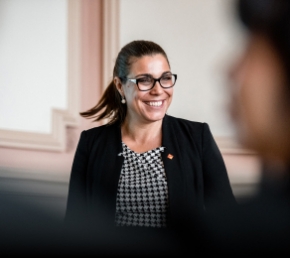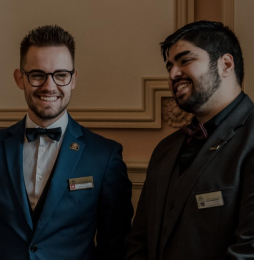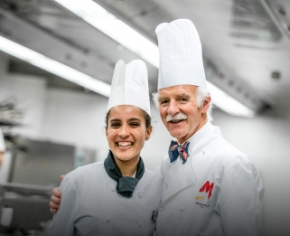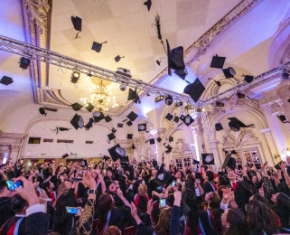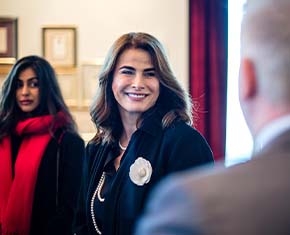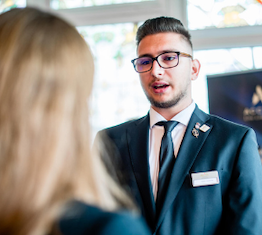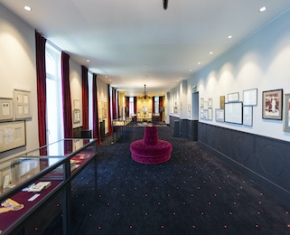- About
- Schools
- Lifelong Education
- News & Events
- Community
#Academics
The Innovation Switch
The Innovation Switch aims at establishing a global dynamic to enhance innovation among all César Ritz Colleges stakeholders: students, lecturers, management, and staff.
Project Summary
The objective is to expose everyone to the possibility to innovate in a safe, supportive, and inspirational environment. The Innovation Switch, which comes in the form of courses, a club, immersive projects, partnerships, and experiential activities, is supporting the evolution of the school’s culture to meet the world’s challenges. It formally shapes with metrics and processes what has intuitively been the school’s values since its creation 40 years ago: innovation and entrepreneurship.
Audience / Problem addressed by the project
Innovation is a complex and confusing process in which most ideas never turn into actions, and while everyone wants to innovate and be creative, only a very few manage to deliver. Harvard Business Professor Clayton Christensen elaborated that roughly 95% of newly launched consumer products fail each year and, according to the 2019 StartUp Genome report, 11 out of 12 startups fail (Startup ecosystem).
Being innovative is one top 5 skills needed on the job market, according to the World Economic Forum report, "Future of Jobs", but how can we teach these higher order thinking skill (HOTS) in higher education? Many projects fail, leading to frustration and discouragement, and creating a static mindset. The key question is not, "how to teach innovation", but "how to create a context that enables a culture of innovation".
Our solution to solve the problem
The Innovation Switch encourages a global change of mindset by exposing all stakeholders to innovation. At César Ritz Colleges we believe that to create a culture of innovation we have to tackle the challenge in multiple ways. That's why the Innovation Switch is holistic, multi-dimensional, cross- departmental, and global. It is about seizing every opportunity to expose the stakeholders to experimental innovation.
Our students have innovation courses, participate in an Innovation Week twice a year, and they can join the Innovation Club. They meet inspirational speakers and are encouraged to investigate partnerships and thrive in a solution-oriented context.
Our lecturers and management participated to a an innovative and creativity workshop together last year. Lecturers participate to “Innovation Focus Groups” where, we share best practices, coordinate progression, participate to “share and reapply” sessions. We have peer reviews and a space to test and fine-tune our pedagogical ideas.
How is the project improving pedagogical practices?
The Innovation Switch supports existing pedagogical practices and enhances the global teaching practices with the perspective of innovation. Recent research has emphasized the major changes in teaching in recent years. Already Barber (2013) stated in his eloquent title, “An Avalanche is Coming: Higher Education and the Revolution Ahead”, that it is a necessary disruptive issue and he foresaw that the academic landscape will have to deal with massive changes that he names an ‘avalanche of disruptions’ in higher education.
If we focus on our students, a major advantage of Digital Natives is their willingness to take responsibilities and to be ready to go the extra mile if the subject and the learning experience is relevant to them, in other words, if it is worth the effort. They are already well educated, imaginative, collaborative and confident; the main point is to get them to focus and to trigger motivation (Barber 2013).
The Innovation Switch fully aims to create more engagement within César Ritz Colleges’ existing practice.
How is the project improving higher education?
We have at heart to globally create a culture of innovation and entrepreneurship; the pillars of the school’s vision. Global engagement is what drives us – ensuring that the Innovation Switch reaches everyone. It is not about creating an innovation department in charge of innovation, but to establish a trend, vision, and direction to change the school culture in the long run.
In order to create the Innovation Switch, we have looked into The World Economic Forum (2020) report, “Schools of the Future Defining New Models of Education for the Fourth Industrial Revolution”, that has identified 8 critical characteristics in learning: “global citizenship skills, innovation and creativity skills, technology skills, interpersonal skills, personalized and self-paced learning, accessible and inclusive learning, problem-based and collaborative learning, and lifelong and student-driven learning”.
Based on these characteristics, the Innovation Switch aims at providing a better higher education to tackle the challenge of a world that does not yet exist.
Participants and reach
Each of the 250 students on campus takes part in the one or more aspects of the Innovation Switch (courses, the club, inspirational field trip, animal care, partnership, or Innovation Week.)
All lecturers attend Innovation Week, peer reviews, and best practice meetings.
The Innovation Switch is deployed at Le Bouveret campus of César Ritz Colleges at this point. With 51 nationalities represented among our 250 students, the Innovation Switch has an international reach of 51 out of the 195 United Nations countries.
César Ritz Colleges’ publications related to the Innovation Switch
Genin D., (July 6, 2021) Why Confused Students Learn Better: Confessions of an Evil Teacher. Education, Harvard Business Publishing. Available from: https://hbsp.harvard.edu/inspiring-minds/why-confused-students-learn-better
Gazzola P., Pavione E., Grechi D., Ossola P. (2018) Cycle tourism as a driver for the sustainable development of little-known or remote territories: the experience of the Apennine regions of Northern Italy. Sustainability 10 (6), 1863
Gazzola P., Grechi D., Ossola P., Pavione E. (2019) Certified Benefit Corporations as a new way to make sustainable business: The Italian example. Corporate Social Responsibility and Environmental Management. 26 (6), 1435-1445
Innovation Switch project
According to our student surveys, 95% of students who attended Innovation Week said that they "feel ready to tackle innovation in their future jobs".
Intangibly, the students are spontaneously heading to the Innovation Club and reaching out to lecturers or staff with ideas to deploy. We witness the development of a solution-oriented mindset and more engagement demonstrating the growing ownership of our students. Whether it is about creating a garden on the campus or to tackling a cigarette waste problem, the students identify a problem, generate a solution, and work to deploy it. We can see the beginning of a change of mindset from, "There is a problem, someone should do something about it", to "There is a problem, how can I solve it?”
Development and scalability of the Innovation Switch
The Innovation Switch is at the early stage of its development. We are formally shaping the Switch for all our stakeholders, including guest speakers, suppliers, and partners. We expect that 20% of all the curriculum content will focus on innovation in the short term.
For the next two years: We are planning to increase funding for the Innovation Lab to expand the learning experience and support all stakeholders. We intend to establish more corporate partnerships with a focus on startups. The third priority is to have a closer collaboration with Mass Challenge, a non-profit organization dedicated to supporting innovation and entrepreneurship through collaboration and development. https://masschallenge.org/
Our 3 to 5-year projection: The following step will be to support innovation in Hospitality Awards with funding for startups and early-stage ventures, bringing innovation to the core of the industry with the Innovation Switch.
#Academics

